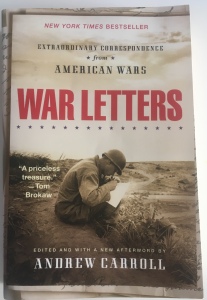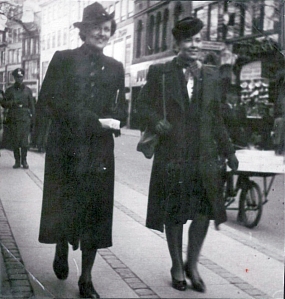Homage To The Fallen Soldiers
War Poems and Letters
This year 2018 will mark the centenary of the end of World War One. Writing this, I am thinking of all the dead and wounded soldiers who lost their lives or got injured for being in the prime years of their youth.
The English poet Wilfred Owen (1893-1918) was one of them. He died in battle on 4 November 1918 a few days before Armistice. Before that at the fierce battle of Somme in March 1917, he suffered from shell shock which forced him to withdraw. (Source “The Great War in Portraits” a publication from National Portrait Gallery in London).
For us so many years later, the War Poems from that time can be hard to understand, but I see that his poems are realistic and not the least romantic. From “Wilfred Owen The War Poems”:
“In the middle of March, Owen fell through a shell-hole into a cellar and was trapped there for three days with only a candle for company. This experience, compounded with the sickness (probably the result of concussion) that followed his escape, no doubt contributed to the dark images of an Underworld in many of his later poems. After a fortnight in a clean hospital bed, he rejoined his Battalion and was involved in fierce fighting; at one point being blown out of the trench in which he was taking cover from an artillery bombardment that had already dismembered a brother officer in a neighbouring trench. Owen escaped unscratched, but these experiences had taken their toll, and on 1 May he was seen by his Commanding Officer to be behaving strangely. He was probably told to pull himself together and report to the Battalion Medical Officer, who found him to be shaking and tremulous and his memory confused. In due course, he was diagnosed as suffering from neurasthenia (shell-shock) and invalided back, first to England, then to Craiglockhart War Hospital on the outskirts of Edinburgh”.
His doctor believed shell-shock to result from broken contact with real life, and sought to re-establish that vital connection using work- cure”. At the War Hospital, he became close friends with Sassoon:
“The older poet’s advise and encouragement, showing the younger how to channel memories of battle- recurring in obsessive nightmares that were a symptom of shell-shock- into poems, complemented Dr.Brook’s work-cure”.
Sonnet
On Seeing a Piece of Our Heavy Artillery
Brought into Action
Be slowly lifted up, thou long black arm,
Great gun towering towards Heaven, about to curse;
Sway steep against them, and for years rehearse
Huge imprecations like blasting charm!
Reach that Arrogance which needs thy harm,
And beat it down before its sins grow worse.
Spend our resentment, cannon,-yea, disburse
Our gold in shapes of flame, our breaths in storm.
Yet, for men’s sakes whom thy vast malison
Must wither innocent of enmity,
Be not withdrawn, dark arm, thy spoilure done
Safe to the bosom of our prosperity.
But when thy spell be cast complete and whole,
May God curse thee, and cut thee from our soul!
War letters

War Letters from American Wars, Andrew Carroll
Edited by Andrew Caroll
An excerpt from a letter from a surviving combat pilot Lt. Lewis Plush to his parents in California, November 1918
Now that it is all over, what is there to look back upon? The fifteen months in France have been like a book with strange chapters, a book that leaves a lasting grip on the imagination……
“One of our planes did not return,” says the official report of the day and we each wonder but dare not ask aloud, “Who will be next?”
Oh, fateful vision that now appears of the three comrades, three friends that shared the same billet in the home of a French family near the flying field where we worked and played together. I am one of the three. The other two are dead.
My good blogging friend, G.P. Cox, inspired me to write about young men and their ultimate sacrifice in war. Cox blogs in honour of his late father who was a paratrooper in WWII in the Pacific. Whenever I see gravestones from the wars, I think about their short lives and that they often died alone and far away from home. Cox sent me a link to a young blogger and musician Zoolonhub who wrote a poem about dying young at the battlefields. “Aged 19”. The writer was 20 years old when he visited a vast WWI cemetery in Northern France, and he says:
The gravestones seem to speak. They told me thee from our soul! How lucky I was.
The last part of Lt. Lewis C. Plush’s letter
There was a war, a great war, and now it is over. Men fought to kill, to maim to destroy. Some return home, others remain behind forever on the fields of their greatest sacrifice. The rewards of the dead are the lasting honors of martyrs for humanity; the reward of the living is the peaceful conscience of the one who plays the game of life and plays it square
My aunt Ermegaard was three years, November 11, 1918. When she saw the many Danish flags in her town that day, she saw it was because of her birthday. During WWII she took the role as a courier for the underground resistance. Luckily she was never discovered by the Germans. She never talked about it, but I am glad she did her little part in the fight for freedom. I wrote about her in a Danish blog post which can be translated.

Ermegaard and Helle in Copenhagen during the war a German soldier in the background




A lovely post, Maria, and it’s always good to be reminded of the futility of war by Wilfred Owen’s wonderful poetry.
LikeLike
I am so glad to hear from you Clive and thank you. It’s not easy for me to understand the old poems but I chose one I think I understand! He saw how hideous the war was
LikeLiked by 1 person
I’d imagine they aren’t easy if English isn’t your first language. He saw it at first hand and suffered from it, even before his death. His poems are masterpieces of the genre.
LikeLiked by 1 person
I will try to read some more of them.
LikeLiked by 1 person
A wonderful tribute, Maria. It is also a great reminder for others who need to know what it took!!
LikeLike